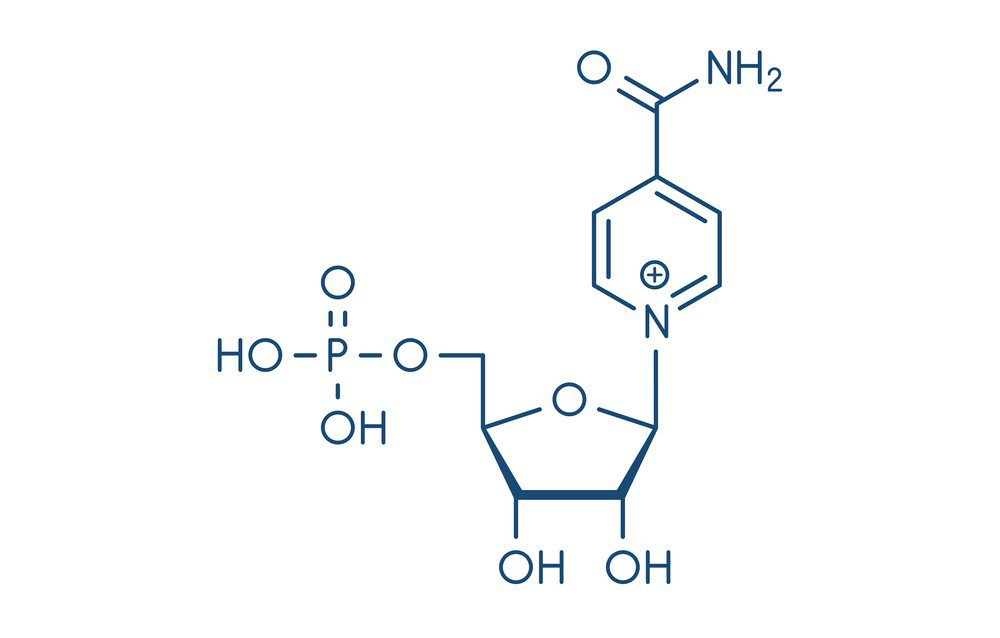NMN(Nicotinamide mononucleotide) is a molecule that plays a crucial role in the biosynthesis of nicotinamide adenine dinucleotide (NAD+), a coenzyme found in all living cells. NMN has a chemical structure as follows:
Chemical Formula: C11H15N2O8P
Molecular Weight: 334.24 g/mol
NMN is a nucleotide, and its structure consists of a ribose (a sugar) molecule linked to a nicotinamide base and a phosphate group. The nicotinamide base is derived from vitamin B3 (niacin) and serves as a precursor for the biosynthesis of NAD+, which is essential for various biological processes, including energy metabolism and DNA repair.
As for the physical properties of NMN, it is typically found as a white to off-white powder. Its solubility and stability can vary depending on the specific salt form (e.g., NMN chloride, NMN monophosphate) and the conditions in which it is stored. NMN is generally water-soluble and can be dissolved in aqueous solutions for research and supplement applications.

Application of NMN
Nicotinamide mononucleotide (NMN) is a molecule that has gained significant attention in the field of aging research and human health. NMN is a precursor to nicotinamide adenine dinucleotide (NAD+), a coenzyme that plays a crucial role in various biological processes, including energy metabolism and DNA repair. The application of NMN primarily revolves around its potential to boost NAD+ levels, which is thought to have various health benefits. Some of the key applications of NMN include:
Aging and Longevity: NMN has garnered interest for its potential role in slowing down the aging process and extending lifespan. Some studies in animals have shown that NMN supplementation can increase NAD+ levels and improve various age-related markers, including DNA repair and mitochondrial function.
Energy and Metabolism: NAD+ is essential for cellular energy production, and NMN supplementation is believed to support metabolism and enhance energy levels. This has led to NMN being marketed as a potential energy booster.
Cellular Health: NMN is thought to promote healthy cellular function by supporting DNA repair mechanisms. This could have implications for cancer prevention and treatment.
Cardiovascular Health: Some research suggests that NMN may have a positive impact on cardiovascular health by improving blood vessel function, reducing inflammation, and supporting heart health.
Neurological Health: NMN and NAD+ are involved in various processes related to brain health and cognitive function. Some studies indicate that NMN may help protect against neurodegenerative diseases, such as Alzheimer’s and Parkinson’s.
Exercise Performance: Athletes and individuals interested in physical performance have explored NMN as a potential supplement to enhance endurance and recovery, although the evidence for this application is limited.
Diabetes and Metabolic Health: NAD+ is involved in regulating blood sugar levels, and NMN may help improve insulin sensitivity and manage metabolic disorders like diabetes.
It’s important to note that while NMN shows promise in animal studies, human research is still relatively limited, and the long-term safety and efficacy of NMN supplementation are not yet fully understood. As of my last knowledge update in September 2021, NMN was primarily available as a dietary supplement, and its regulation and approval by health authorities varied by country. If you’re considering NMN supplementation, it’s advisable to consult with a healthcare professional who can provide guidance based on your specific health goals and conditions. Additionally, you should stay informed about the latest research and developments in this field, as our understanding of NMN’s effects on health continues to evolve.
